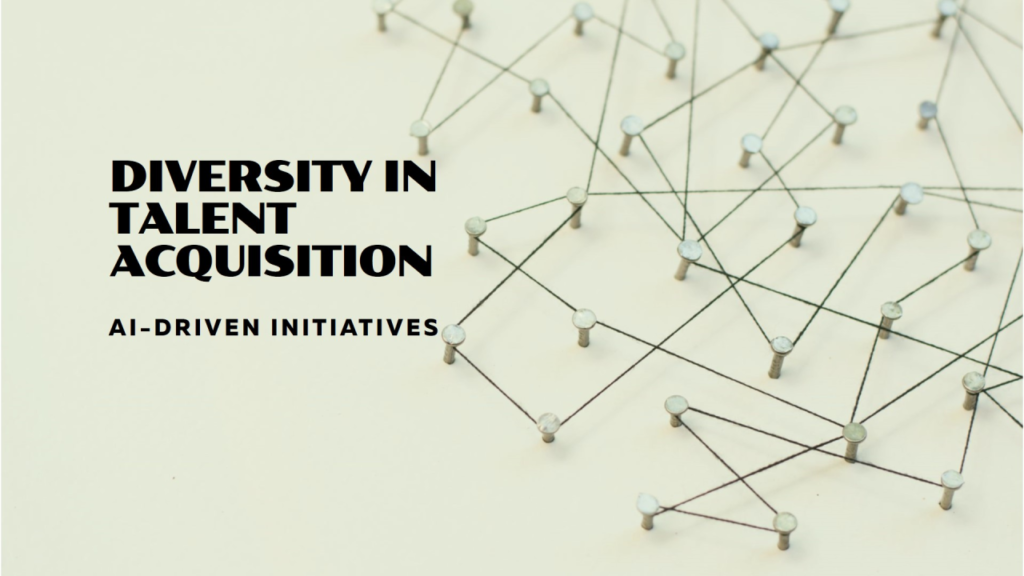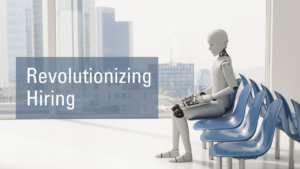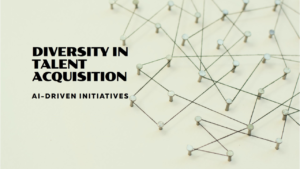Diversity, Equity, and Inclusion (DEI) have become essential components of organizational success in today’s dynamic workforce. Companies worldwide recognize that diverse teams drive innovation, improve decision-making, and foster more dynamic work environments. As organizations strive to create inclusive workplaces, Artificial Intelligence (AI) has emerged as a powerful tool to support diversity initiatives in talent acquisition. This blog explores how AI-driven strategies are transforming recruitment, enhancing diversity, and promoting equitable hiring practices.
The Role of AI in Talent Acquisition
AI in talent acquisition involves leveraging machine learning algorithms, natural language processing, and data analytics to streamline and enhance the hiring process. From sourcing candidates to final selection, AI tools automate repetitive tasks, analyze large datasets, and provide unbiased insights, making recruitment more efficient and objective.
How AI Supports Diversity Initiatives
- Reducing Unconscious Bias Blind Screening: AI algorithms can anonymize resumes by removing identifiers such as names, gender, age, and photos, focusing solely on skills and qualifications. This reduces the risk of unconscious biases influencing hiring decisions. Bias Detection: Advanced AI tools identify biased language in job descriptions and suggest neutral alternatives to attract a diverse candidate pool.
- Widening the Talent Pool Diverse Sourcing: AI searches beyond traditional platforms, tapping into diverse talent databases, social media, and niche job boards to reach underrepresented groups. Candidate Matching: AI-driven platforms match candidates based on skills and potential rather than just past experiences, providing opportunities to non-traditional candidates.
- Enhancing Interview Processes Standardized Assessments: AI-powered tools provide standardized testing environments, ensuring all candidates are evaluated fairly based on objective criteria. Structured Interviews: AI guides interviewers with structured questions, reducing personal biases during evaluations.
- Monitoring and Reporting Diversity Metrics Data-Driven Insights: AI analytics track diversity metrics across recruitment stages, helping HR teams identify gaps and measure the effectiveness of DEI initiatives. Predictive Analytics: AI forecasts diversity trends, enabling proactive strategies to address potential disparities in the talent pipeline.
Benefits of AI-Driven Diversity Initiatives
- Objective Decision-Making: Data-driven processes minimize subjective judgments, leading to fairer hiring decisions.
- Improved Talent Acquisition: A diverse workforce brings varied perspectives, enhancing creativity and problem-solving capabilities. #InnovativeWorkforce
- Enhanced Employer Branding: Demonstrating a commitment to diversity attracts top talent who value inclusive workplaces.
- Regulatory Compliance: AI helps organizations comply with diversity-related legal requirements by providing transparent and consistent hiring practices.
Challenges and Ethical Considerations
- Algorithmic Bias: AI systems can inadvertently perpetuate biases present in historical data. Continuous monitoring and algorithm audits are essential to mitigate this risk.
- Data Privacy Concerns: Handling sensitive candidate information requires robust data security measures to protect privacy.
- Over-Reliance on Technology: While AI enhances recruitment, human oversight is crucial to ensure ethical considerations and contextual understanding in hiring decisions.
Best Practices for Implementing AI-Driven Diversity Initiatives
- Diverse Training Data: Ensure AI models are trained on diverse datasets to minimize biases.
- Regular Bias Audits: Conduct frequent audits to identify and address potential biases in AI algorithms.
- Transparency: Maintain transparency in AI-driven processes to build trust among candidates and stakeholders.
- Human-AI Collaboration: Combine AI insights with human judgment for balanced and ethical decision-making.
- Continuous Learning: Keep AI systems updated with the latest DEI trends and best practices to enhance effectiveness.
Case Studies
- Microsoft: Utilizes AI tools to analyze job descriptions, ensuring inclusive language that appeals to diverse candidates.
- LinkedIn: Employs AI-driven algorithms to recommend job opportunities to underrepresented groups, promoting equal access to career advancements.
- SAP: Uses AI to track diversity metrics in real-time, helping HR leaders make data-informed decisions to improve DEI outcomes.
The Future of AI in Diversity and Inclusion
The future of AI in talent acquisition is promising, with advancements focused on:
- Ethical AI Development: Creating algorithms designed to prioritize fairness and equity.
- Inclusive AI Design: Engaging diverse teams in AI development to incorporate varied perspectives.
- Adaptive Learning Systems: AI models that evolve with changing diversity dynamics and organizational goals.
Conclusion
AI-driven diversity initiatives are revolutionizing talent acquisition, enabling organizations to create more inclusive, equitable, and dynamic workplaces. While AI offers powerful tools to support DEI goals, it is essential to implement these technologies thoughtfully, with a strong emphasis on ethical practices and human oversight. As companies continue to embrace AI, they have the opportunity to lead the way in fostering diverse and inclusive environments that drive innovation and success.
#Diversity #Inclusion #AIinHR #FutureOfWork #DiversityMatters #AIinRecruitment #AdaptiveAI #ContinuousImprovement #HumanInTheLoop #PredictiveHiring #EquitableHiring #EmployerBranding #TalentAcquisition #HRTech




